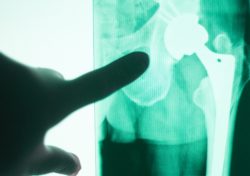Top Class Actions’s website and social media posts use affiliate links. If you make a purchase using such links, we may receive a commission, but it will not result in any additional charges to you. Please review our Affiliate Link Disclosure for more information.
The FDA is reportedly hearing about metal hip implant problems, including an increased number of adverse events and other problems.
Members of the Immunology Devices Panel of the Medical Devices Advisory Committee were told about metal hip implant problems on the first day of a two-day meeting, according to MedPage Today. These panel members reportedly heard that it is hard to determine which patients are more likely to experience adverse events.
Some patients will obviously have an issue with their metal hip implant if they have a preexisting issue like a metal allergy.
Unfortunately, according to the report, it is hard for doctors to screen for these allergies, meaning that they are unable to predict if a metal-containing hip implant will work well in a patient. Another problem is, even if a metal allergy is known, doctors do not always know the metallic components found in medical devices, meaning that a patient may have an adverse reaction despite being cautious.
When patients don’t have an obvious aversion to metal implants, the issue is complicated even further, according to the MedPage Today report on the meeting.
“While the majority of patients experience no clinically significant local or systemic adverse health effects we believe that a small subset of patients may develop more severe and persistent inflammatory [reactions that] may not be detected, even in larger or longer clinical studies,” the FDA’s Aron Yustein reportedly said in his presentation. “Furthermore, in clinical practice, it may be difficult to link these reactions to the device, which may have been implanted years before, and may be functioning well.”
Part of the panel’s meeting aims to help the FDA address concerns about metal hip implant problems and how to identify at-risk patients. The public had until December 2019 to add comments on the issue.
Metal Hip Implant Problems
Metal-on-metal hip implants are a type of medical device that uses all metallic components – meaning that metal surfaces articulate against each other. These devices are reportedly associated with a higher failure rate than other devices which use plastic and ceramic surfaces.
In the past, the FDA has held other advisory committee meetings about metal on metal hip implants to determine the failure rates associated with the devices. A 2012 meeting reportedly resulted in a January 2013 proposal from the FDA to change approval requirements for metal on metal hip implants.
In 2016, a final order was published which required metal on metal hip device marketing to cease until manufacturers submitted their devices for approval. There are currently no metal-on-metal total hip replacements approved by the FDA and only two metal on metal hip resurfacing devices available.
Although the availability of metal on metal hip implants has been drastically reduced, thousands of patients in the country still have a metal on metal hip implant and countless other have implants that use metal.
Reasons for Implant Failure

German researchers found unusually high amounts of dissolved metal ions in the tissue, bone marrow, blood and joint fluid of 18 patients who needed a revision surgery after their metal on metal implants failed. According to the Arthritis Foundation, metal ions are able to travel through the bloodstream, crossing the membranes of cells.
Researchers found the metal debris interfered with the mechanism of mesenchymal stem cells (MSCs) in the bone marrow. These particular stem cells evolve into different types of specialized cells, including osteoblasts, which build bone. When the MSCs cannot do their job, no new bone is formed.
Scientists found that even though the stem cells were significantly impaired when it came time to turn into osteoblasts, the stem cells had no problem becoming cartilage cells and fat cells.
Carsten Parka, MD, medical director for the Center of Musculoskeletal Surgery at Charite-Universitatsmedizin in Berlin, authored the study and said the only way to make sure hip implants are safe and durable is to fully understand how the materials used affect the body.
Researchers also noted it’s important to consider that every patient’s body is different, which means their own anatomy and biological makeup will affect the outcome, too.
The U.S. Food and Drug Administration advises patients with metal on metal hip implants to let their surgeons know if they have had any changes in their health at all because metal hip implant problems can include metal ions damaging the heart and other vital organs.
What Are Some of the Symptoms of an Adverse Reaction to Implants?
According to the FDA, metal on medical devices can result in an immune or inflammatory reaction on a local or systematic scale. This can reportedly result in symptoms such as fatigue, rash, joint and muscle pain, and weakness. With the recent advisory committee meeting, the FDA aims to hear concerns about the issue so they can work towards a resolution.
Join a Free Metal Hip Implant Revision Surgery Lawsuit Investigation
If you or someone you know has or needs to have your metal on metal hip implant replaced because of any of a number of complications, a hip implant attorney would like to speak with you to determine if you are owed compensation for your injuries.
ATTORNEY ADVERTISING
Top Class Actions is a Proud Member of the American Bar Association
LEGAL INFORMATION IS NOT LEGAL ADVICE
Top Class Actions Legal Statement
©2008 – 2024 Top Class Actions® LLC
Various Trademarks held by their respective owners
This website is not intended for viewing or usage by European Union citizens.
Get Help – It’s Free
Join a Free Metal Hip Implant Revision Surgery Lawsuit Investigation
An attorney will contact you if you qualify to discuss the details of your potential case at no charge to you.
PLEASE NOTE: If you want to participate in this investigation, it is imperative that you reply to the law firm if they call or email you. Failing to do so may result in you not getting signed up as a client or getting you dropped as a client.
E-mail any problems with this form to:
Questions@TopClassActions.com.
Oops! We could not locate your form.













